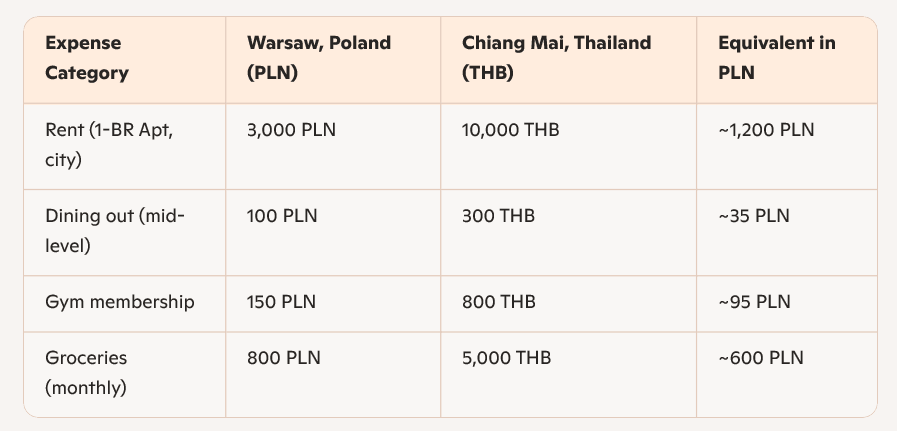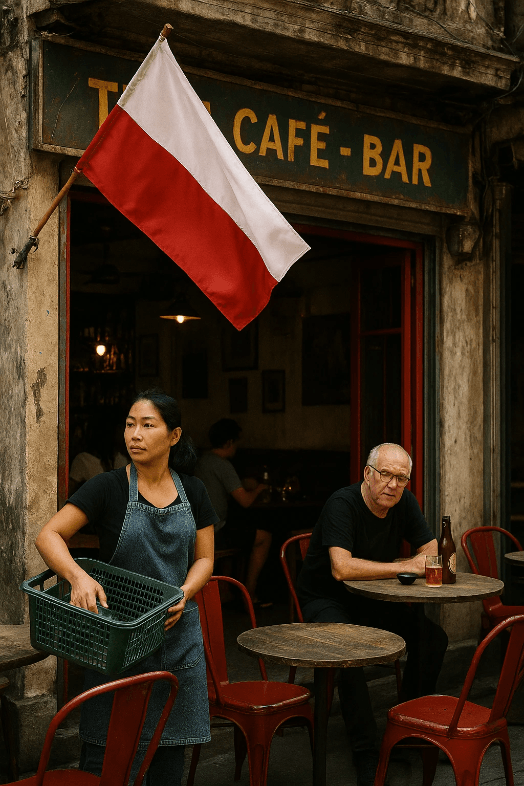From Kraków to Krabi: Why More Poles Are Trading Pierogi for Pad Thai
🌅
I
ntroduction: The New Path to Paradise
“At a sunlit café in Chiang Mai, Michał sips iced coffee and describes his former life in Warsaw. ‘I had the job, the apartment, even the car,’ he says. ‘But I was always asking myself: is this it?’ Like thousands of other Poles, Michał now calls Thailand home — not out of necessity, but out of possibility.”
Across the turquoise waters of Koh Samui and through the rice-scented alleyways of Bangkok, a quiet migration is gaining momentum. While traditional migration has long led Polish citizens westward toward Germany, the UK, or the Netherlands, a growing number are charting a southeast course toward Thailand. In 2025, Polish migration to Thailand is not a phenomenon measured in mass statistics, but in lifestyle shifts, philosophical awakenings, and entrepreneurial adventures. What’s drawing the citizens of a historically homogenous, Catholic European nation to the temples and tuk-tuks of the Thai kingdom?
Across the turquoise waters of Koh Samui and through the rice-scented alleyways of Bangkok, a quiet migration is gaining momentum. While traditional migration has long led Polish citizens westward toward Germany, the UK, or the Netherlands, a growing number are charting a southeast course toward Thailand. In 2025, Polish migration to Thailand is not a phenomenon measured in mass statistics, but in lifestyle shifts, philosophical awakenings, and entrepreneurial adventures. What’s drawing the citizens of a historically homogenous, Catholic European nation to the temples and tuk-tuks of the Thai kingdom?
This article uncovers the sociological, economic, and lifestyle dynamics behind this surprising exodus — painting a portrait of migration that’s not about fleeing, but about embracing.
🧭 1. Sociological Shift: From Survival Migration to Aspirational Movement
Poland's migration story is deeply rooted in necessity. Following World War II and the communist era, millions of Poles sought refuge or opportunity in more stable, western countries. The 2004 accession to the European Union opened borders and labor markets, prompting a wave of economically driven migration to the UK, Ireland, and Scandinavia.
But Thailand represents something different.
“It’s not just a place to earn — it’s a place to live,” says Aneta, a 32-year-old digital marketer who relocated to Phuket in 2022. “We’re no longer just chasing wages. We’re chasing experience, balance, and fulfillment.”
This is reflective of a broader shift in global Polish diaspora patterns. According to sociologist Dr. Marcin Kaczmarek of Jagiellonian University, “The migration story is evolving. Especially among younger generations, there’s an ethos of personal development and cultural curiosity driving decisions.”
Where once emigration was tied to economics, today it’s increasingly cultural, spiritual, and psychological. Thailand’s reputation for hospitality, peace, and personal freedom resonates with Poles seeking to redefine their lives outside rigid European structures.
Online networks have amplified this shift. Polish-language YouTube channels like Thai Vibes and forums such as Polonia w Tajlandii (Poles in Thailand) showcase real-life stories of those making the leap. These digital platforms reduce barriers to entry, providing visa guidance, housing advice, and emotional solidarity — forming digital villages that support physical relocation.
💶 2. Economic Realities: Sunshine for Złoty
While lifestyle might spark the flame, financial dynamics fuel the fire. Thailand offers an alluring economic proposition for Polish migrants — especially those embracing remote work or small business ventures.

(Source: Numbeo, 2025 estimates)
This financial flexibility allows Polish migrants to either upgrade their quality of life — or sustain a comfortable lifestyle on modest income.
Moreover, Thailand’s growing acceptance of remote workers and digital nomads — bolstered by extended tourist visas and entrepreneurial opportunities — means that Polish freelancers in fields like graphic design, e-commerce, or coaching can operate freely.
“Twelve years ago, this wouldn’t have been viable,” says Paweł, an SEO specialist who manages European clients from his beachside apartment in Krabi. “But today, I work with Polish companies while living in paradise.”
Entrepreneurial Poles are also making their mark. From vegan cafes in Pai to meditation retreats in Koh Tao, Polish-led businesses are quietly flourishing, often combining Polish sensibilities with Thai flavors.
🌴 3. Lifestyle Allure: Climate, Creativity, and Conscious Living
Beyond finances and forums, there's an undeniable emotional and sensory magnetism to Thailand.
☀️ The Climate Cure
Long Polish winters — grey skies from October to March — contribute to seasonal affective disorder and energy depletion for many. Thailand's consistent sun, warm temperatures, and lush greenery offer a therapeutic counterpoint.
“After my first winter in Thailand, I realized I hadn’t felt that low in months,” says Zofia, a former teacher turned wellness coach.
🛶 Spiritual and Cultural Draws
Thailand’s deep Buddhist heritage, daily rituals, and slower pace of life contrast sharply with Poland’s fast-moving, often stress-inducing culture. Many Polish migrants report feeling a sense of personal awakening or peace in Thai settings.
“I came for the beaches, but stayed for the mindfulness,” remarks Tomasz, who transitioned from a banking career in Poznań to running a small meditation center in Chiang Rai.
Thai cuisine — light, spicy, and tropical — also holds unexpected appeal. With coconut curries and fresh fruit replacing kielbasa and potatoes, many migrants report feeling healthier and more energized.

Thailand’s visual beauty — from golden temples to turquoise waters — feeds artistic souls. Polish photographers, writers, and designers often find the inspiration they lacked in urban Poland.
There’s also freedom of self-expression. While Poland wrestles with political tensions and social conservatism, Thailand (despite its own limitations) often feels more open and accepting — particularly in beach towns and creative enclaves.
🇵🇱 4. Poland-Specific Dynamics: Generational and Cultural Transitions
To understand this migration, one must also understand what’s happening within Poland itself.
🧠 Generational Philosophies
Millennials and Gen Z in Poland are diverging from their parents' values. They prioritize travel, emotional well-being, and purpose over possessions and status.
“Stability isn’t enough anymore,” says 28-year-old Ola, who works as a yoga instructor in Chiang Mai. “We want to explore, challenge norms, and reinvent ourselves.”
Many Poles in their 20s and 30s now view migration as a creative act — not a rejection of Poland, but a pursuit of something expansive.
🌍 From EU Migration to Global Citizenship
During the mid-2000s, young Poles flooded western Europe to seek better wages. Today, many of those same people are looking even farther — beyond EU borders. Global connectivity has made destinations like Thailand feel closer, safer, and more feasible.
Thailand’s increasing exposure through Polish tourism also plays a role. As more Poles visit Thailand on vacation, they develop emotional attachments that sometimes lead to permanent relocation.
🧘♀️ Psychological Resilience and Reframing Risk
There’s also a philosophical shift. Polish society — once defined by caution, stability, and tradition — is becoming more adventurous. “We’re learning to take risks, to move away from what’s expected,” says cultural commentator Magdalena Wolska. “Thailand represents that spirit — a step into the unknown that feels empowering rather than frightening.”
💬 Real Voices: Stories Behind the Shift
Kamil, 40, from Łódź:
“I was burnt out. I was working 60 hours a week in tech, never seeing sunlight. I booked a trip to Bangkok — and never left. Now I freelance from a hammock and spend weekends scuba diving.”
Basia, 35, from Gdańsk:
Basia, 35, from Gdańsk:
“The first time I did a cooking class in Chiang Mai, I felt like I’d found my calling. Now I teach Polish–Thai fusion cuisine to tourists, and I’ve never been happier.”
Marcin and Karolina, 29, from Wrocław:
Marcin and Karolina, 29, from Wrocław:
“We sold everything. Bought one-way tickets. We now run a small guesthouse in Pai and help Polish travelers experience slow living. It’s not perfect, but it’s ours.”
🧠 Challenges and Complexities: Not Just Sunshine
🧠 Challenges and Complexities: Not Just Sunshine
Of course, not everything is idyllic. Navigating Thai bureaucracy, maintaining visas, and confronting cultural misunderstandings can be challenging.
Thai language barriers, visa restrictions, and moments of homesickness are frequent topics in Polish expat groups. And while Thailand is generally safe, navigating healthcare, legal systems, or unexpected political developments can feel daunting.
Moreover, permanent integration is rare. Most Polish migrants in Thailand occupy a space of semi-permanence — staying for years on extended tourist visas, but not necessarily settling permanently.
“There’s a tension,” says sociologist Kaczmarek. “A feeling of being both grounded and transient. Thailand allows for reinvention, but permanence remains elusive.”
🔮 Looking Forward: What Thailand Represents
Ultimately, Thailand is not just a destination — it’s a symbol. It represents freedom from constraint, openness to change, and the possibility of a life lived differently.
For Poles accustomed to structure, history, and cold seasons, Thailand offers something warm, flexible, and deeply personal. Migration here isn’t about escape — it’s about expansion.
As global mobility increases and digital nomadism becomes mainstream, Thailand is likely to remain a favorite for Polish investors.
